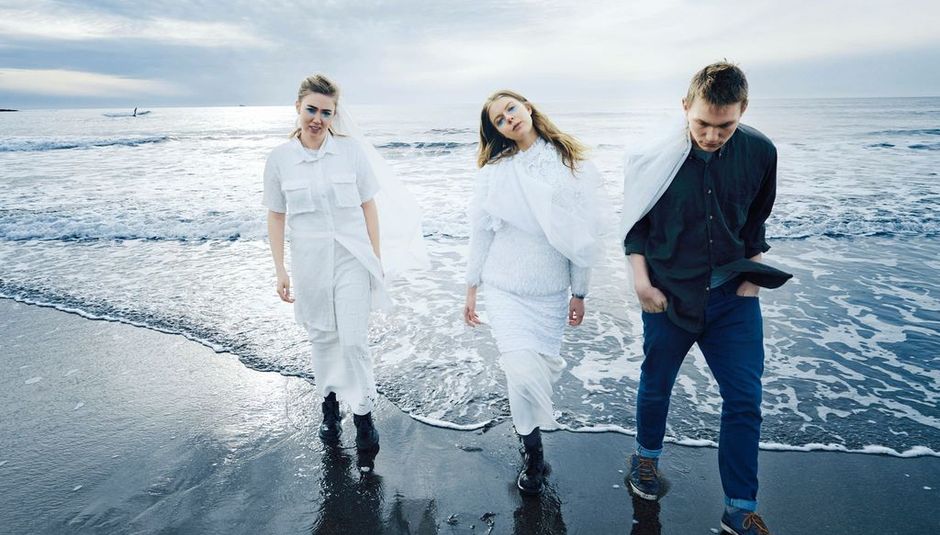Icelandic trio Samaris came together in 2011 in a seemingly unlikely meeting of minds, with electronic producer Þórður Kári Steinþórsson (aka ‘Doddi’), clarinetist Áslaug Rún Magnúsdóttir and vocalist Jófríður Ákadóttir combining to make some of the most original music you’ll have the pleasure of hearing. A breakout performance at Iceland Airwaves 2012 brought them to the wider world’s attention, and things only seemed to have got steadily bigger from there. With two EPs (Hljóma Þú and Stofnar Falla) under their belts, they signed to One Little Indian (putting them in the company of Iceland’s most famous daughter, Björk), and released Samaris, which compiled the aforementioned EPs and marked the band’s first international release. 2014 brings us to the next chapter in Samaris’ story, Silkidrangar - a record which more than amply demonstrates their ability to create haunting soundscapes that capture the bleak yet beautiful nature of their home country. DiS caught up with Jófríður while she was back in Iceland taking a break from a fairly busy summer schedule.
DiS: Let’s start with the album, Silkidrangar. How did the process of creating a full-length record compare to recording the first two EPs?
Jófríður Ákadóttir: It was much more of a massive project really, it was kinda hard to see the end of it at some points because we felt like we’d never be done. We didn’t do one power session, we did lots of small things and divided the tasks between us, then came back together in the studio. For me, when I think about it, it’s something that took a whole year in process, from starting to talk about it to actually finishing it - and that’s such a long time! So many things happened in that period that it’s hard to get a nice overview, it’s all a mess in my head at the moment. Maybe in ten years I will look back and it will be like “ok, that was the album.”
Now you’ve done both, which would you say you prefer?
I definitely prefer doing EPs, because you’re a little bit more focused, as we obviously weren’t when we doing the album. You’re more focused and you have a clearer idea and vision of what you want to do, so I think in the future we want to try doing that. Also, we’re teenagers, still - well, not for long now, but we’re very young, we have a very short attention span, and for us it’s easier to finish a shorter project. Not that I’m unhappy with the album, I’m very happy with it! But when I think back and when I want to look forward, I think [recording EPs] is what we’re more interested in doing. But we would never have known that if we hadn’t done the album.
The lyrics in your songs come from 18th-19th Century Icelandic poetry. How does the language used in the poems compares to modern day Icelandic?
It’s still very appropriate, there are loads of poems that we can pick from but we only pick the ones that we can relate to, so it already relates to modern times. Many of them are about nature, and nature hasn’t changed much, thankfully - a little bit has changed, but it’s still there and it’s still very present in our lives, so I feel like that’s definitely a part that we’re very inspired by. Some of them are love stories, and they’re about dramatic relationships - that’s the easiest way to put it.
Are these poems commonly known? Would they be studied at school or university, or have you had to dig through poetry books to find the ones you really want to use?
All of these, really. None of them are very famous, because most of the really famous ones have already got a song, so when people think of that they would attach it to the other song. We kinda like to dig in deep - and that’s actually quite easy, we just go to the bookshelves of our parents or our grandparents and there are loads of things there to take from. But yes, people are definitely studying these [poems]. I remember I took some literature courses when I was in college, and we read a lot of the same authors, so I definitely got a good introduction.
When you’re writing a song, do you write music to fit the mood of a poem, or do you look for the poems that fit the mood of the music you’ve already created?
It kinda happens at the same time, it’s all very hand in hand. We choose the poem while we are creating the song. So we would open up the computer, and we would just start off with creating a mood and a beat, then we would add the chords, and then we would start skimming through the books and eventually find the poem that fits to the melody that I have in mind, or the mood that’s in the song.
Outside of the poems on Silkidrangar and the EPs, are there any other poems that you would particularly like to use in a Samaris song? Oh yeah, definitely! I’ve been reading a lot of poetry by women, and I really want to focus a bit on that. They’re really interesting as well, there are lots of lullabies that are very creepy - lullabies are so creepy if you think about it, especially the Icelandic ones! So I really want to do that, a kind of creepy lullaby tune.
Could that be a potential concept for a new EP, maybe?
Yeah, definitely! And we’ve got loads of different concepts, we want to do a goth album, we want to do a techno album, and everything in between.
Would you consider working with poetry written in other languages - not necessarily English, I mean everyone asks you “do you want to sing in English?” - but any other languages?
I definitely would consider it, yeah, I wouldn’t think it’s such a stupid idea! I don’t want to rush into it and do it for the sake of doing it, but if we find something that we’re very intrigued by I would definitely be open for it - even English as well. But what I am against is translations, because I feel that just doesn’t do it justice, because there is already such a nice song within the words that have been written. A lot of Icelandic artists are very excited to show people abroad their songs and then translate them, and I think that’s all very well, but our concept is just not like that. We haven’t written lyrics with a message that we want to deliver, we’ve written them as a piece of music, so we just want to deliver it as the best piece of music that we possibly can - and that happens to be in Icelandic. We don’t want to translate just for the sake of translating, we’d rather that people listen to it and listen to the sounds. But if we hear something [in another language] that is amazing we’ll definitely be open for it - it just hasn’t happened yet so it’s hard to say.
For me, it makes sense that the words are in Icelandic, as it adds to the mystery of the music. Is that something you’re trying to capture, a sort of mysterious feel?
In a way, yeah. I mean, poetry is quite mysterious because often you have to read between the lines, so in Icelandic it’s already quite mysterious even though people can understand the language. So yes, it definitely adds to the mystery and I think that’s good. It’s hard to put yourself in the feet of the foreigners that hear it and they can’t understand a single word, but I imagine it must be a little bit fun and interesting. I do like listening to music that I can’t understand, and if it’s good music then I don’t really care, so I guess that’s the same.
I noticed that ‘Hafið’ is listed as featuring [Icelandic electronic musician] Muted on the back of the album sleeve. What was his involvement in that track?
Muted is a musician who lives out in the countryside of Iceland, he lives very far in the deep of the east. Doddi has been writing to him ever since we started the band, and he did a remix for us on the [Hljóma Þú] EP that we were very happy with. We wrote this song, ‘Hafið’, - it kinda has a dramatic feel, with the chord progression and everything, and Doddi was stuck with it. I was telling him “it sounds great, what are you doing, what’s wrong with you?” and he was like “no, I’m not happy with it.” So he ended up sending the parts to Muted, who finished the track and the production, and did the beats and the soundscape. So that was his part in the song, and it definitely saved it, because at that point we all really wanted to use this song but Doddi was unsatisfied with it.
Are there any other musicians, electronic or otherwise, that you’d like to collaborate with?
I think that the more we go into the concept work or the EP stuff, it would be very interesting to talk with people who have been doing only that idea, or working only with that style - so say we’re doing something that’s very deep and smooth, or very dancey, it would be very interesting to get someone’s approach on that, because it’s maybe not our specialty yet. I haven’t really thought about it much, it kinda depends on what we do next, which we still haven’t decided.
I really liked the expanded woodwind section that you hear at the end of ‘Vögguljóð’, it reminded me a little of These New Puritans’ last two albums. Do you think you might incorporate additional elements of classical music into your songs in the future?
I made this arrangement for a clarinet choir that Áslaug and I play with, and I thought it would be nice to break [the album] up. But we ended up having a bit of an argument about this song, because Doddi thought that it didn’t fit in at all, while we were kinda saying “yeah, that’s the whole point, we have something at the end that’s very different and surprising.” So we ended up having to compromise, and the song wasn’t included on the vinyl.
Yeah, I noticed that, it stops at ‘Hrafnar’ and I thought “where’s the last song?”
Yeah, I know! But I really like this song, so I’m glad we got it through in some way, even if it’s not fully embraced like the rest of the songs. I would love to do more of these calm and clean Samaris songs, but the electronics are a really important part for Doddi, so I wouldn’t want to take that away from him. I guess in the future we would do different versions and have them as b-sides or something. I don’t want to walk away from this idea completely, but we always have to compromise.
You’ve had the opportunity to travel quite a lot over the past few months, what has been the most interesting or inspiring place you’ve been to?
When you’re traveling, it happens very easily where you turn off the touristy part [of your brain], and you get so focused on playing a show. But we went to Sydney in January, and [at that time] in Iceland it was completely dark, I hadn’t seen the sun for two months, and then suddenly we got thrown into going all the way to Sydney, where it was boiling hot. For me, that was such a crazy experience, because we were in Sydney for a week, and then I was back in Iceland and it was the same, there was no sunlight, and there were only a few hours where it was a little bit grey. So that was a crazy nice vitamin D boost, and I was so thankful that we got to do that, it kept me going until the sun came back to Iceland!
You’re playing a whole bunch of festivals over the summer and then continuing to tour into September. Are there any particular shows or festivals that you’re looking forward to?
I’m actually looking forward to Green Man a lot, in Wales. I heard a lot about Wales because we work with some people from there, and that’s exciting, I’ve never been. There’s a festival in Germany that we’re playing in the beginning of August that’s I’m very excited about, it’s an electronic festival called Nachdigital, so I can’t wait to do that. September’s going to be a bit different as it’s less festivals and more shows, but I think that’s going to be fun too.
And then you’re rounding off the year with Iceland Airwaves, is this the fourth time you’ve played the festival?
With Samaris we played for the first time in 2011, and I played in Pascal Pinon, my other band [with twin sister Ásthildur], in 2009, so that makes this the sixth year!
How important do you feel that particular festival is to the Icelandic music scene?
It’s the biggest showcase festival, I mean there are other festivals like ATP and Sonar as well, but they’re more like ‘festival’ festivals - people come there and listen to the music, and there’s only a few bands playing and everyone goes to see them. Whereas Iceland Airwaves is a showcase festival where everyone is going everywhere, everyone is going crazy, so Icelandic bands are playing 10 shows over the whole weekend. I think my record was playing 12 gigs or something, and it was just horrible, I was doing school at the same time! I ended up taking time off school just to do Airwaves. It’s a little bit like it’s not Reykjavik anymore - I mean, it is Reykjavik, but the whole scene just comes over there, and that’s a little bit crazy. For me it felt like I was going abroad and I had to do this work session. But I think that this year I’m only playing with Samaris and I think it’s going to be relaxed - I hope so! I just want to play this show and do really well, and maybe do a few off-venues, maybe one or two - last year we did one and that was quite nice, just to do very little, and choose it well. Because the off-venues can be a little bit crazy as well, people are crammed in these tiny rooms, and there’s no proper sound system and everything’s so rough and raw.
You do get some very surreal shows sometimes, yeah.
But I mean that’s great, that’s what Airwaves is all about! But I think that maybe this year I want to try and relax a little bit and see some bands and have fun. I’ve always been so stressed! But I think it’s a very important event, because you get to invite all these people that matter in the music scene home to your doorstep, and you get to show them like “this is where I played my first gig, this is where I drink my coffee,” it’s just like that. So I think in many ways it’s important for us to have this festival - I always look forward to it every year, and we always try and do something special.
Once you’re done with this run of touring, what’s next for Samaris?
Well, just making more music! I’m at this point where I decided to only do this for a while and then go back to studying, so I feel like I just have to make the most of it and do as much as I can, and enjoy it, that’s the most important thing. I realised the other day when we were doing long line of shows that I wasn’t enjoying it that much - I had to stop and shake myself and think “why the hell are you doing this if you’re not enjoying it?” It is very fun, but you have to sometimes make it fun, because it’s always very hard too.
You mentioned that touring can be difficult sometimes, is there any particular experience that you’ve had that’s been a bit of a nightmare?”
We played a festival the other day and our computer didn’t turn on! We only had a line check so it was super stressful to find some Wi-Fi and download playbacks - in the end we had to cut a few minutes off our set. It was such a terrible experience - we didn’t have any time to put on any outfits or anything so we were basically playing in our pyjamas. It’s the only thing I really hate about computer music, you rely completely on the computer and sometimes they break and you have no idea how to fix it. But I also got a little bit sick of it when we were playing the other day in Denmark, and it was just so hot - I was not used to it, not ready for it, I was about to pass out! But apart from that, it’s all been very nice.
Silkidrangar is available now on One Little Indian.
For more information on Samaris, visit their official website.























